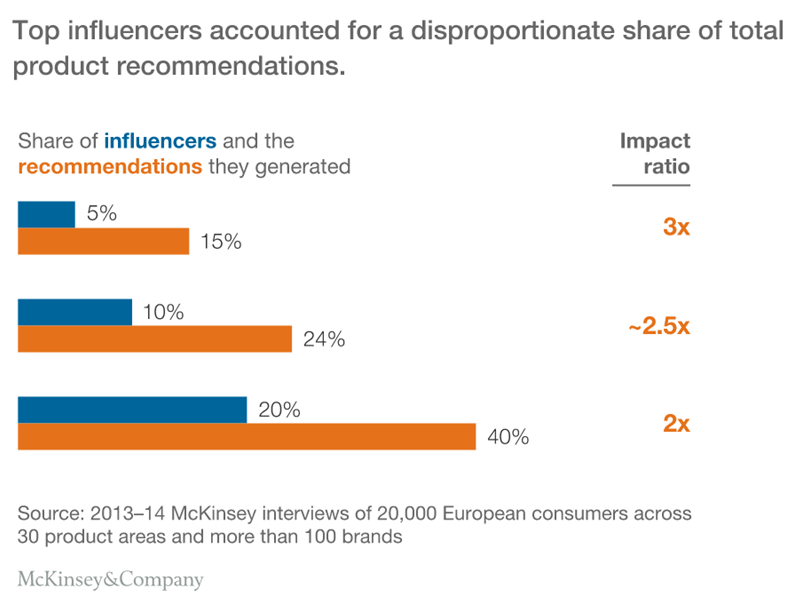(c)iStock.com/gremlin
The majority of consumers trust peers, friends and much . But who do consumers hear the online? If high-profile characters and celebrity names spring to mind, think twice. Consumers are a discerning lot than some brands may realise.
While many consumers follow stars with huge social media audiences (Katy Perry includes a whopping 73 million Twitter followers at present), it’s doubtful they’ll rely on these “mega-influencers” for property or financial information. They’re more inclined to trust influencers that have expertise.
Research released last month from McKinsey shows that social media buzz and recommendations play a bigger role in persuading consumers to make a purchase than previously believed. It shows the influencers’ pool is untapped. The analysis of 20,000 European consumers revealed that recommendations encouraged an average of 26% of purchases,together with two-thirds of the impact occurring in the critical point of purchase.
McKinsey found that while the role of influence is currently expanding, a small number of busy influencers accounted for a disproportionate share of total recommendations:

So how can marketers locate and engage with the pros consumers trust most?
Logic would assume that followers equal reach for a brand. This will not necessarily ring true. Experts with followings values and often talk to varied audiences. Take parties.
Let’s imagine you receive a mega-influencer on board to endorse your brand through their social media platforms. A high number of consumers will likely sees their messages but many of them will care? Are you going to be reaching your target market or just making sound that audiences do not want to hear?
These types of scenarios have led brands to rethink their participation plans with internet influencers. Many manufacturers have found that concentrated experts with subject experience can be far more powerful in influencing customers.
Some focused experts may garner less attention due to their lack of affiliation with businesses or media outlets. This independence is a powerful asset. Consumers perceive focused experts to possess objectivity, which can help bolster trust and engagement levels.
Locating focused influencers
Up until a few years ago, it had been hard for brands to locate concentrated experts online. The Web abounds with recommendations, remarks and testimonials, making it hard for brands and customers to know who’s credible and trustworthy. Brands must therefore find approaches to recognize and engage with influencers who can speak to their target markets.
How can these influencers be identified by manufacturers? As a starting point, it is important to specify exactly who your client is. Who buys your product or service and where do they reside? Demographics Consumer data and interests can help you map out a path where they’re on the internet for meeting with your consumers.
Following this, you’ll have to determine whom your consumers trust and listen to. Until the advent of affect trackers, this was a task; undertake their research or brands were needed to carry stab.
There are resources that enable the influencers to be more easily identified by brands in their customers ‘subjects of interest with experience. Manufacturers can gain much nearer insights into who and what matters most to their own customers concerning testimonials, ratings, marketplaces and communities in acquiring this knowledge.
It is important to not forget that focused experts may not have too many followers as actors or some other online influencers; however have will be committed and interested .
Promote your brand through concentrated experts
You are able to start engaging them, once you understand which concentrated experts your customers hear this most. You want your relationships to seem as objective as you can. Since this will diminish the trust that customers feel towards the influencer and their messages, it is significant that endorsements don’t seem paid-for.
Regardless of this, some influencers will expect some compensation for their acceptance. You may be imaginative with your approach, offering incentives, perks, experiences or non-cash rewards along with your product or brand. As an instance, you may offer to help them build credibility and their reach by featuring them throughout your brand’s advertising and media channels that are social.
Another way to encourage endorsement is to provide a VIP experience of your product or brand to specialists. This could, as an instance, entail giving them a first trial of a new product lineup, and promotions, like discounts. By doing so, you can get them engaged with your brand whilst also creating topic matter to compose.
Brands shouldn’t be wasting time, money and staff on trying to drive out their messages via “mega-influencers” online. This strategy achieves less cut-through and return on investment (ROI). You can ensure your promotion efforts are so are more likely to deliver real outcomes, and targeted through pinpointing focused pros that customers already trust.

